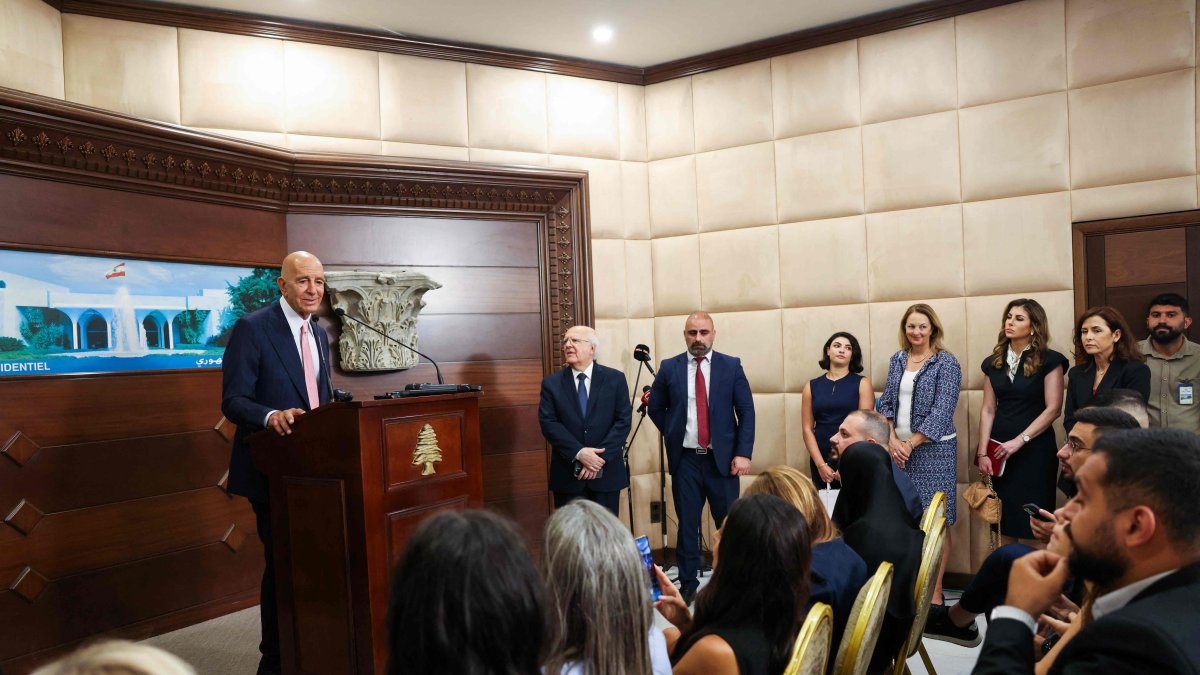The US ambassador to Türkiye and Special Envoy to Syria and Lebanon sparked a debate with his remarks in a press conference in Beirut.
The US ambassador to Türkiye and Special Envoy to Syria and Lebanon sparked a debate with his remarks in a press conference in Beirut.
Orçun Göktürk, from Beijing / China
In recent days, Tom Barrack, the U.S. Ambassador to Ankara and also the Special Envoy for Syria, tried to give a “lesson in civilization” during remarks to journalists in Lebanon. At a press conference in Beirut, the representative of an imperialist country soaked in blood lost his temper at pressing questions and declared: “The moment this turns chaotic and animalistic, we are out. Behave civilized, be kind, be tolerant.”
Barrack’s words were, quite rightly, harshly criticized by journalists and professional associations in Lebanon. The Journalists’ Union described the statement as “inappropriate” and demanded an apology, while press unions called for a boycott. As the backlash intensified, Barrack was forced to step back, claiming he had no intent to insult.
But why did these words spark such a strong reaction? Because the phrase “behave civilized” may seem like a call for politeness on the surface, but in essence, it reflects a deep-rooted orientalist perspective. This rhetoric is a typical manifestation of the West’s imposition of its own criteria of “civilization” as universal values, positioning Middle Eastern peoples, journalists, and societies as an “other” that needs to be civilized.
As Edward Said pointed out, Orientalism is not merely a form of knowledge production but also a discourse of power. Barrack’s words reproduce the hierarchy that frames the “Western” as civilized and the “Eastern” as potentially chaotic and animalistic. This language is part of a broader claim of cultural superiority that legitimizes the U.S. political presence in the Middle East.
Human Rights Violations in the U.S.
The condition of the country from which Barrack tried to deliver his civilization lesson is, in fact, dismal. China’s annually published Report on Human Rights Violations in the United States lays bare the hypocrisy of such Western rhetoric. The latest report, released on May 29, 2024, by the State Council Information Office of China, examines in detail America’s human rights record. Let us look at some key findings:
- Gun violence and mass shootings: Civilians’ right to life is increasingly under threat. Throughout 2023, tens of thousands of people lost their lives due to gun violence (an average of 117 people are killed in daily armed clashes).
- Police brutality and lack of judicial accountability: Many minority groups, especially Black and Latino populations, face police violence, while the judicial system often leaves such violations unpunished.
- Mass incarceration: Although the US accounts for 5% of the world’s population, it holds 25% of the world’s prison population, making it the country with the highest number of prisoners.
- Economic and social inequality: The phenomenon of the “working poor” is growing. Access to healthcare and housing is increasingly left to the mercy of the market (Additionally, nearly 700,000 people are homeless, approximately 16% of the child population, equivalent to 2.4 million children, live in poverty, and 26 million people lack health insurance., millions trapped in the drug crisis, over 35,000 missing children cases each year).
- Political polarization: Electoral manipulation, voter disenfranchisement, and political violence are on the rise. The U.S. “model of democracy” is rotting from within.
- Racism and discrimination: African Americans, Asian Americans, immigrants, and Indigenous peoples face systemic discrimination.
- International violations: Unilateral sanctions, occupationist ventures, and military interventions in U.S. foreign policy violate the right to life of millions of people around the world (The total death toll in the foreign “war on terror” waged after 9/11 is between 4.5 million and 4.7 million.).
Double Standards and Global Orientalism
Barrack’s “behave civilized” remark in Lebanon and the violations revealed in China’s report are in fact two sides of the same coin. On the one hand, a degrading discourse disguised as a lesson in civilization; on the other, policies and practices that destroy the lives of hundreds of thousands of people at home and abroad.
The West’s ongoing orientalist approach today is not merely cultural arrogance but also a political instrument. Yet, documents such as China’s report provide ways to expose this hypocrisy in the international arena.
In conclusion, those who presume to give lessons in “civilization” must first examine their own human rights record. Against the diplomatic language that reproduces Orientalist perspectives and the hegemonic policies that drag the world into bloody conflicts, the rising anti-imperialist wave and the solidarity of oppressed nations stand against those who seek to lecture them on civilization today.

















Leave a Reply